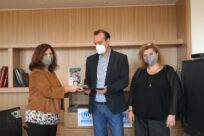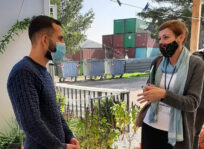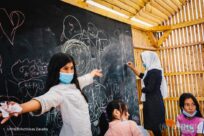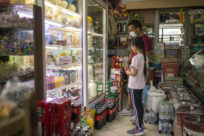UNHCR study shows rapid deterioration in living conditions of Syrian refugees in Jordan
UN High Commissioner for Refugees António Guterres says large numbers of Syrian refugees are sliding into abject poverty, and at an alarming rate, due to the magnitude of the crisis and insufficient support from the international community.
He made the statement at the launch of a new UNHCR study, Living in the Shadows, which reveals evidence of a deepening humanitarian crisis. High Commissioner Guterres is on a two-day visit to Jordan, where he will meet refugees profiled in the study in Amman and others at the Za’atari refugee camp.
“I am here to express my solidarity with Syrian refugees, as the impact of snowstorm Huda is still tangible and posing an even greater strain on their already dire living conditions.” Guterres is also meeting with Jordanian officials and with donors to coordinate efforts to improve living conditions for Syrian refugees and support the communities hosting them.
Conducted by UNHCR and International Relief and Development (IRD) the study is based on data from home visits with almost 150,000 Syrian refugees living outside of camps in Jordan in 2014.
According to the study, two-thirds of refugees across Jordan are now living below the national poverty line, and one in six Syrian refugee households is in abject poverty, with less than $40 per person per month to make ends meet.
Almost half of the households researchers visited had no heating, a quarter had unreliable electricity, and 20 per cent had no functioning toilet. Rental costs accounted for more than half of household expenditures, and refugee families were increasingly being forced to share accommodations with others to reduce costs.
“Unless the international community increases its support to refugees, families will opt for ever more drastic coping strategies,” Guterres said. “More children will drop out of school to work and more women will be at risk of exploitation, including survival sex.”
As the Syrian conflict approaches its fifth year, many refugees are becoming increasingly dependent on assistance. Jordan’s resources and infrastructure, too, have been stretched to the limit.
In an effort to address this critical situation, UNHCR is providing monthly cash assistance to 21,000 of the most vulnerable Syrian families, or 14 per cent of the Syrian refugee population living outside camps. As of the end of 2014, over 10,000 additional Syrian refugee households have been identified as eligible for such assistance but, due to lack of funds, cannot be provided with support.
Overall, the report’s findings make it clear that any further reductions in the current levels of support will have immediate and serious consequences for Syrian refugees in Jordan. The situation is particularly worrying for the most vulnerable populations, such as female-headed households and elderly refugees.
Guterres emphasized that this crisis can be mitigated if the international community steps up efforts to alleviate the suffering of the refugees. He praised the efforts of the Jordanian authorities, UNHCR and its partners to address the urgent needs of refugees during last week’s heavy snowstorm.
In total, Jordan has a registered Syrian refugee population of 620,000, some 84 per cent of whom live outside camps.
“This represents a dramatic pressure in the economy and the society of the country not to mention the terrible security impact of the Syria crisis in itself,” Guterres said.
“The generosity of the Jordanian people and the Government needs to be matched by massive support from the international community – support for the refugees themselves and for the local populations hosting them, but also structural and budgetary support to the Jordanian Government for education, health, water and sanitation and electricity to enable it to cope with this enormous challenge.”
Additional Information:
– The “Living in the Shadows” report is available on our media page at: http://unhcr.org/jordan2014urbanreport/.
Page 9 of 26
-

UNHCR donates electronic equipment to the Ministry of Education and Religious Affairs to support inclusion of refugee children
11 Nov 2021In the context of the long-standing cooperation of UNHCR, the UN Refugee Agency, with the Ministry of Education and Religious Affairs, 59 laptops were recently donated by UNHCR to reinforce the capacity of the country’s schools to provide education for all and promote the inclusion of refugee children in the […]
-

Maria Clara Martin takes office as UNHCR’s new Representative in Greece
9 Nov 2021UNHCR, the UN Refugee Agency, is pleased to announce that Maria Clara Martin has assumed her functions as the Agency’s Representative in Greece. She succeeds Mireille Girard, who led the UNHCR Office in Greece since early 2021. Maria Clara Martin’s career in human rights, refugee and migration issues spans over […]
-

UNHCR launches its 25th annual student contest about refugees: “Education cannot wait!”
2 Nov 2021UNHCR, the UN Refugee Agency, announces the launch of its 25th annual National Student Contest in Greece. The theme for the school year 2021-2022 is “Education cannot wait!”. UNHCR’s National Student Contest which focuses on refugee issues, has been held since 1994. It includes all students across the country, attending […]
-

Ministry for Migration and Asylum and UNHCR sign Memorandum of Understanding to strengthen cooperation on integration for refugees in Greece
29 Oct 2021The Greek Ministry of Migration and Asylum and UNHCR, the UN Refugee Agency, have signed a Memorandum of Understanding (MoU) which will support efforts for the local integration of refugees and asylum-seekers in Greece. This MoU formalizes the existing cooperation between the Ministry and UNHCR in this area. The Memorandum […]
-

Racist Violence Recording Network: No room for complacency towards racist violence one year after the conviction of Golden Dawn
11 Oct 2021One year after the historic conviction of Golden Dawn, the Racist Violence Recording Network (RVRN) calls to mind the importance of the judicial decision that sent a clear message against the criminal organization and organized racist violence. In parallel, the Network warns that there is no room for complacency, as […]
-

World Mental Health Day – Mental health care for all: let’s make it a reality
8 Oct 2021This Sunday (10 October) marks “World Mental Health Day”, with a focus on ensuring that mental health care is accessible for all. Mental health includes our social, psychological, and emotional wellbeing. According to the World Health Organization, 22% of adults in conflict settings have been impacted by mental health issues […]
-

UNHCR hands over the management of the cash assistance programme for asylum seekers in Greece to the Greek Government
30 Sep 2021Athens 30 September 2021 – From the beginning of October, the Greek government will take over the management of the cash assistance programme for asylum seekers in Greece. Since the Spring of 2017, cash assistance has benefited the lives of more than 200,000 vulnerable asylum seekers in Greece while contributing […]
-

Five footballs designed by young artists will raise funds for refugee sports programmes
10 Sep 2021Today, UNHCR, the UN Refugee Agency, announced the winners of the second annual Youth with Refugees Art Contest, which celebrated the power of sport to bring people together. Five of the winning designs are featured on footballs available for sale online and proceeds will go toward sport programmes for refugees. […]
-

UNHCR’s Position and Recommendations on the Safe Third Country Declaration by Greece
2 Aug 2021On 7 June 2021, in a Joint Ministerial Decision (JMD), Greece unilaterally declared Turkey a safe third country for asylum-seekers originating from Afghanistan, Bangladesh, Pakistan and Somalia, in addition to Syria. As a result, the use of admissibility procedures, prior only applied to Syrians, is expanded to four additional nationalities […]
-

Passing of first female UNHCR Director and founder of Greek Council for Refugees, Hari Brissimi
26 May 2021It is with great sadness that UNHCR, the UN Refugee Agency, learned yesterday of the passing of Mrs. Hari Brissimi, a longtime UNHCR official and founder of the Greek Council for Refugees. Hari Brissimi worked in UNHCR between 1955-80 becoming the first woman to be promoted to the senior rank […]
